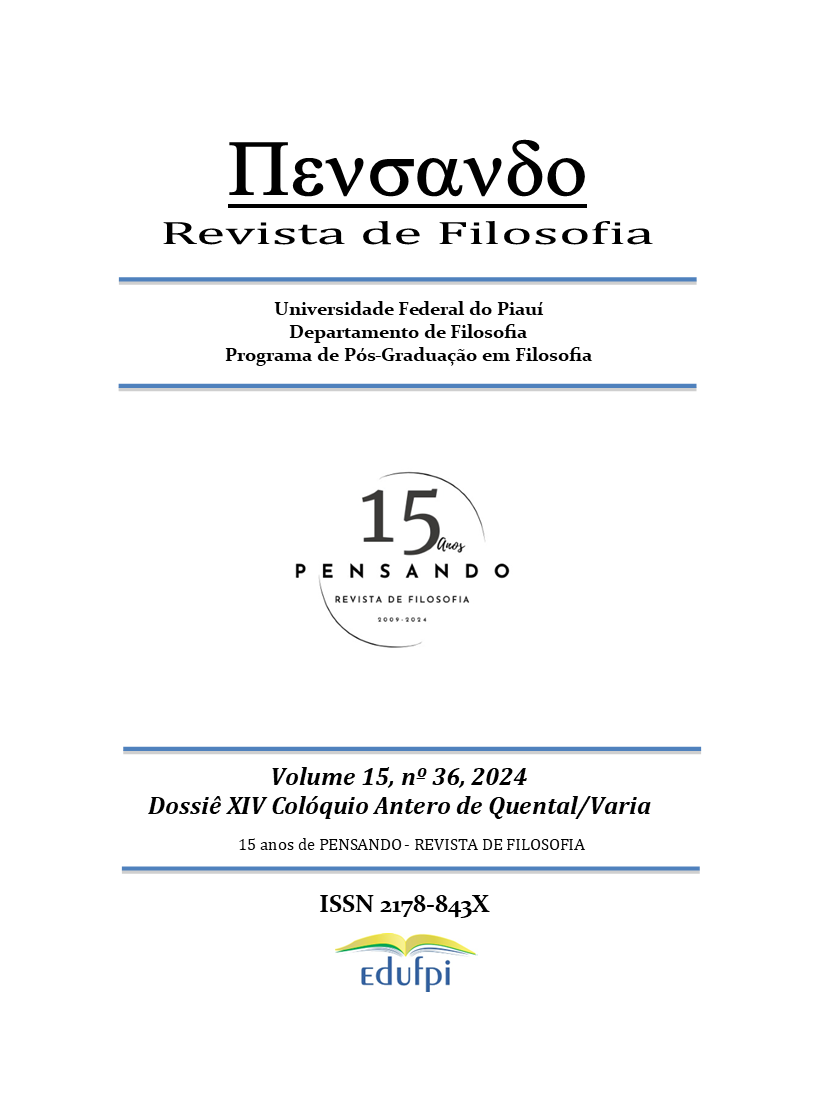Body, Nature and Capital: Uses and Implications of the Concept of Metabolism by Marx
DOI:
https://doi.org/10.26694/pensando.vol15i35.4546Keywords:
Body, Nature, Capital, Metabolism, MarxAbstract
The physiological concept of metabolism, used especially by the human sciences, will play a central role in the critique of Marx's political economy by deepening his understanding of the immanent determinations of capital, as it digests, moved by an excessive "compulsion", living matter (earth and human bodily strength) to transform it into value and surplus-value and the catastrophic damage that is excreted in this process. In this perspective, we intend to analyze in the Grundrisse of 1857-1858 at least five distinct movements expressed by the concept of metabolism: A) The processes of nature in the autonomy of their cycles; B) The vital process of interaction between the human body and the earth; C) The functioning of the social form historically derived from capital, from and on the body-earth interaction; D) The transformation processes that occur in the substance of value through exchanges between Commodity and Money; E) The consumption necessary for the reproduction of the different parts that make up the organism of capital in the production process. A sixth use of the term appears in Book I of Capital in the Marxian diagnosis of metabolic failure by identifying how the metabolism of capital operates, and can only operate, causing a failure in the human-nature metabolism. The theoretical and practical implications of this analysis lead us to think about the need to create a new socioeconomic form of production and reproduction that enables a healthy metabolism with nature around us and within us, a non-pathological future social body.
References
ANDERSON, Kevin. Marx nas Margens: Nacionalismo, Etnia, e Sociedades não-Ocidentais. São Paulo: Boitempo, 2019.
DIAS, Maria Cristina Longo. Modo De Produção Capitalista e a Constituição de Opressões para Silvia Federici: Caminhos de Luta a Partir De Angela Davis e Djamila Ribeiro. Revista Ideação, N. 42, Julho/Dezembro2020.
DUSSEL, Enrique. A Produção Teórica de Marx – Um Comentário aos Grundrisse. Tradução de José Paulo Netto. 1ª edição. Expressão Popular: São Paulo, 2012.
EAGLETON, Terry. O Sublime no Marxismo. In: EAGLETON. A Ideologia da Estética. Trad. Mauro Sá Rego. Rio de Janeiro: Zahar editora, 1993.
FEDERICI, Silvia. Calibã e a bruxa: Mulheres, Corpo e Acumulação Primitiva. São Paulo: Elefante, 2017.
FOLADORI, Guillermo. O Metabolismo com a Natureza. In: Revista Crítica Marxista, São Paulo, Boitempo, nº 11, p. 105-117, 2001.
FOSTER, John Bellamy. A Ecologia de Marx: Materialismo e Natureza. Tradução de Maria Teresa Machado. Rio de Janeiro: Civilização Brasileira, 2005.
FOSTER, John Bellamy; CLARK, Brett. Marxismo e a Dialética da Ecologia. Revista Crítica Marxista, n. 50. São Paulo, p. 171-191, 2020.
FOSTER, John Bellamy. The Return of the Dialectics of Nature: The Struggle for Freedom as Necessity. Disponível em: <https://monthlyreview-org.translate.goog/2022/12/01/the-return-of-the-dialectics-of-nature/?_x_tr_sl=en&_x_tr_tl=pt&_x_tr_hl=pt-BR&_x_tr_pto=sc> (Acesso em 06/2023).
GONZALEZ, Lélia. Primavera para as Rosas Negras. Diáspora Africana, 2018.
HARVEY, David. O Corpo como Estratégia de Acumulação. In: HARVEY. Espaços de Esperança. São Paulo: Loyola, 2000.
MARX, Karl. Grundrisse. Tradução de Mario Duayer e Nélio Schneider. São Paulo: Boitempo, 2011.
MARX, Karl. Manuscritos Econômico-Filosóficos. Tradução Jesus Raniere. São Paulo: Boitempo, 2010.
MARX, Karl. O Capital: Crítica da Economia Política: Livro 1. Tradução Rubens Enderle. São Paulo: Boitempo, 2017.
MOORE, Jason (Org.). Antropoceno ou Capitaloceno? Natureza, história e a crise do capitalismo. São Paulo: Editora Elefante, 2022.
MUSTO, Marcello. Repensar Marx e os Marxismos. Tradução Diego Silveira. São Paulo: Boitempo, 2022.
SAFFIOTI, Heleieth. A Mulher na Sociedade de Classes: Mito e Realidade. São Paulo: Expressão Popular, 2013.
SAITO, Kohei. Marx’s ecological notebooks, Monthly Review, v.67, n.9, 2016.
SAITO, Kohei. O Ecossocialismo de Karl Marx: Capitalismo, natureza e crítica inacabada à economia política. Tradução: Pedro Davoglio. 1ª Ed. São Paulo: Boitempo, 2021.
SCARRY, Elaine. The Body in Pain. The Making and Unmaking of the World, New York and Oxford, Oxford University Press, 1985.
TIMPANARO, Severino. On Materialism. NLB, 7 Carlisle Street, London Wr Filmset in Bembo by Servis Filmsetting Ltd., Manchester and printed by Lowe & Brydone, Thetford, 1975.
URANOVSKY. Y. M. Marxism and Natural Sciences. In: BUKHARIN et al. Marxism and Modern Thought. George Routledge & Sons, 1935.
Published
How to Cite
Issue
Section
License
Copyright (c) 2024 PENSANDO - REVISTA DE FILOSOFIA

This work is licensed under a Creative Commons Attribution 4.0 International License.

























